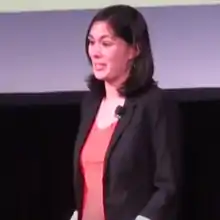Samantha John
Samantha John (born 1985/1986 (age 34–35))[1] is an American entrepreneur, known for being the co-founder of Hopscotch, a learn-to-code application.[2]

Education and Career
John studied applied mathematics, English, and comparative literature at Columbia University.[3][4] John became interested in computers and programming her senior year of college when she began working on a website for a student club.[5] Before developing Hopscotch, she previously worked as an engineer and a developer at Pivotal Labs.[2][6] She had been one of the only women developers in her company.[7] After partnering with Hopscotch co-founder and fellow Columbia alumna Jocelyn Leavitt,[8] John created her first app named "Daisy the Dinosaur" in 2012.[5] John eventually left her consultancy job to pursue the development of Hopscotch full-time. In 2013, Business Insider listed John as one of the "30 Most Important Women Under 30 in Tech", "Silicon Alley 100", and "28 Extraordinary Women in New York Tech" for cofounding Hopscotch Technologies.[6][9][10] Glamour magazine named John and co-founder Leavitt in their list of "35 Women Under 35 Who are Changing the Tech Industry" in 2014.[11] In 2015, she was listed as one of BBC's 100 Women.[1]
Hopscotch
John created Hopscotch at the age of 26[12] with educator Jocelyn Leavitt, who noticed a lack women and people of color in engineering.[5] Hopscotch is the first programming language designed for a touch screen device.[4] John and Leavitt aimed to create a programming language that was simple enough for children to use, while still allowing children to learn and be creative. The app involves a visual programming language, rather than employing lines of code.[13] Hopscotch, which is aimed at children ages eight to 12, was downloaded 20,000 times in its first week.[14] They first launched the app for the iPad in 2013, and have since developed the app for the iPhone. Within one year, users created over 2.5 million projects.[11] Most children use the app to build games and create animated artwork while learning programming basics.[13] According to the founders, nearly half of Hopscotch's users are girls.[11]
Hopscotch was partially inspired by HyperCard, an early software application and development kit which also inspired the creator of "wiki" software, as well as Scratch, an early visual programming environment.[15] In addition, John notes inspiration from her mentor, Alan Kay.[4]
References
- "BBC 100 Women 2015: Who is on the list?". BBC News. 17 November 2015. Retrieved 3 August 2019.
- "Samantha John, 29, USA". BBC News. 16 November 2015. Retrieved 8 December 2016.
- "Samantha John - Founder @ Hopscotch | crunchbase". www.crunchbase.com. Retrieved 2016-12-08.
- Neubronner, Marion (2018-02-06). "Women on Top in Tech – Samantha John, Co-Founder of Hopscotch Technologies". The Asian Entrepreneur. Retrieved 2020-05-24.
- "Celebrating women in tech: Meet Samantha and Jocelyn: founders of Hopscotch". iMore. 2019-04-04. Retrieved 2020-05-24.
- Dickey, Megan Rose. "The 30 Most Important Women Under 30 In Tech". Business Insider. Retrieved 2020-05-24.
- "For Students, the Ipad is the ultimate computer". Mashable. 24 May 2016. Retrieved 8 December 2016.
- Beaudry, Jennifer Ernst (February 1, 2015). "Samantha John: Programming the Future". Columbia Engineering Magazine. Retrieved May 24, 2020.
- D'Onfro, Megan Rose Dickey, Jillian. "SA 100 2013: The Coolest People In New York Tech". Business Insider. Retrieved 2020-05-24.
- Shontell, Alyson. "28 Extraordinary Women In New York Tech". Business Insider. Retrieved 2020-05-24.
- Heintzen, Ariana. "35 Women Under 35 Who Are Changing the Tech Industry". Glamour. Retrieved 2020-05-24.
- "The growing force of women in tech". Marketing Land. 2018-12-05. Retrieved 2020-05-24.
- Stinson, Liz (2016-05-26). "Hopscotch Teaches Kids to Code Without That Pesky Command Line". Wired. ISSN 1059-1028. Retrieved 2020-05-24.
- "The 30 Most Important Women Under 30 In Tech". Business Insider. Retrieved 8 December 2016.
- Arbesman, Samuel. "The forgotten software that inspired our modern world". www.bbc.com. Retrieved 2020-05-24.